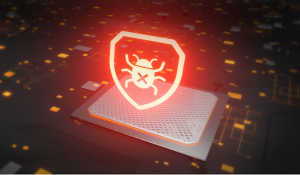Addressing Cybersecurity Strategically: A Board-Level Conversation
June 2024 marked the 11th anniversary of the Harvard Faculty Club's Maximize Your Board's Potential program. It was the second time I've had the...
7 min read
 DriveLock
Sep 23, 2024 12:28:46 PM
DriveLock
Sep 23, 2024 12:28:46 PM
.png)
As organizations embark on their digital transformation journey, endpoint security has become a defining element of business success, and its importance is increasingly recognized at the executive level. For C-level leaders and business stakeholders, protecting endpoints is not just an IT concern—it’s a strategic imperative that directly impacts the organization’s ability to operate securely and efficiently. The traditional perimeter defense strategies that once protected office environments are no longer sufficient in a world where work happens and value is created everywhere—from home offices to cafes, on factory floors, and in the field.
| TABLE OF CONTENT |
The rise of remote and hybrid work models has blurred the boundaries of the traditional workplace, with employees accessing corporate resources from a multitude of locations and devices. In this new landscape, the security perimeter has dissolved, and every endpoint—whether it’s a laptop, smartphone, or industrial device—represents a potential gateway for cyber threats. For business leaders, this means that endpoint security is a critical layer of defense and a strategic realm, essential to protecting sensitive data, maintaining customer trust, and ensuring regulatory compliance.
Neglecting these access points can result in significant costs, both seen and unseen, that directly impact an organization’s bottom line and strategic objectives. The cost of inadequate endpoint security can be divided into 3 categories:
The Cost of Being Attacked: Cyberattacks can be devastating, leading to direct financial losses, reputational damage, and expensive recovery efforts. These attacks often exploit unsecured endpoints, which serve as entry points for malware, ransomware, and other threats. Cleanup costs, ransom payments, legal fees, and customer compensation are just the beginning. The long-term impact on customer trust and brand reputation can be even more damaging, turning a single breach into a prolonged crisis.
The Cost of Managing Security Solutions: Effective endpoint security requires more than just installing antivirus software; it demands continuous monitoring, patch management, policy updates, and user education. The management burden can overwhelm IT teams, especially if security solutions are complex and require constant adjustments. Without streamlined and automated security management, the operational costs can quickly spiral, diverting resources away from core business activities.
The Cost of Decreased Employee Productivity: Security measures should not come at the expense of employee efficiency. Lengthy boot times, cumbersome authentication processes, and intrusive security checks can frustrate employees and hinder productivity. For large organizations, even small delays can add up; for instance, if booting takes just one minute longer for 100,000 employees, the lost time equates to ten thousand of hours each day, translating into significant operational costs.
These hidden costs highlight the need for a robust, efficient, and user-friendly approach to endpoint security—one that safeguards assets without imposing unnecessary burdens. This is where DriveLock’s HYPERSECURE platform stands out, offering a comprehensive endpoint protection solution that balances security with ease of management, affordability, and user experience.
The DriveLock Diamond Framework provides a structured way to evaluate and optimize endpoint security by focusing on security, ease of management, affordability, and user experience.
We explore the four dimensions of the diamond in detail in the following section.
Future-Proof Security:
Endpoint protection often lacks the attention and investment it requires, leading to a buildup of technical debt. This neglect can stem from both underinvestment in crucial technologies by security vendors and a lack of focus from organizations themselves. Endpoint protection frequently lags behind in areas like cloud, the modernization of management consoles and backend infrastructures. Without future-proof security measures, organizations are left vulnerable, relying on outdated systems that struggle to address modern threats.
Companies that prioritize investing in advanced, adaptable endpoint protection technologies see tangible benefits, such as faster breach containment and significantly reduced incident response times—on average by 29 days—minimizing the overall impact of a breach. Future-proofing endpoint security involves not just catching up on technical debt but actively preparing for the evolving landscape, ensuring that protection remains resilient against emerging threats, cloud-native environments, and the latest technological advancements.
Ease of Management:
The operational burden of managing multiple security solutions can be substantial. Gartner’s research indicates that companies with centralized, automated security management spend 30% less time on manual security tasks, which can translate into substantial cost savings. This highlights the value of platforms like DriveLock’s Hypersecure, which integrate and automate critical security processes, making security management more efficient and less error-prone.
Affordability:
Affordability is crucial, especially in environments where IT budgets are stretched. Endpoint protection consists of a set of solutions and practices such as basic protection, extended protection and response, encryption solutions, operational management costs, compliance and regulatory costs, and user training and awareness often from multiple vendors. Organizations that deploy comprehensive, integrated security platforms, like DriveLock’s Hypersecure, can reduce these costs substantially, primarily through decreased management complexity and improved operational efficiencies.
User Experience:
Balancing security with user experience is key to maintaining productivity. Organizations that implement user-friendly security measures, for example report direct reductions in security-related helpdesk calls. Furthermore, companies that optimize security workflows to reduce user friction can see a boost in overall employee productivity. These improvements not only enhance compliance but also ensure that security measures support, rather than hinder, daily operations.
To help guide strategic decision-making, C-level executives should engage their CIOs and IT departments with targeted questions for each dimension of the DriveLock Diamond Framework:
Security: Are our current endpoint security measures comprehensive enough to prevent and detect the latest threats? How quickly can our IT team respond to an endpoint security incident, and what is our current risk exposure?
Ease of Management: Are we maximizing our use of automation in managing endpoint security to reduce manual errors and improve efficiency? How integrated are our security solutions, and what are the time and resource costs associated with managing our current security infrastructure?
Affordability: What is the total cost of ownership for our current endpoint security solutions, and how does this compare to an integrated platform likeDriveLock’s Hypersecure platform? How are we evaluating the financial impact of potential security investments, and are we prioritizing solutions that provide the best cost-benefit ratio?
User Experience: How does our current endpoint security strategy impact employee productivity and overall user experience? Are our security measures creating unnecessary friction for users, and how can we optimize the balance between security and usability?
These questions encourage C-level executives to take a proactive role in assessing and refining their organization’s endpoint security strategy, ensuring it aligns with broader business goals and operational needs. The DriveLock Diamond Framework and Hypersecure platform provide the blueprint for achieving this balance, ultimately driving stronger security and business outcomes.
DriveLock’s Hypersecure platform is more than just a security tool; it’s a holistic endpoint protection suite designed to meet the complex needs of modern businesses. Here’s how it stands out:
Integrated Security: The Hypersecure platform combines DriveLock’s industry-leading preventive defense solutions with European partner technologies, ensuring comprehensive IT security, compliance with regional regulations, and digital sovereignty. Key features include device and application control, robust encryption, and ongoing security awareness initiatives that keep both users and systems secure.
Streamlined Operations: Centralized management and automated processes make security management straightforward and efficient. The platform’s layered security approach provides granular access controls that are cloud-based, easy to use, and cost-effective, minimizing the burden on IT teams while maximizing protection.
Preventive Defense Philosophy: Rather than reacting to threats, the Hypersecure platform proactively defends endpoints by restricting access to only approved devices and applications. This approach significantly reduces the risk of breaches without needing deep access to all system layers, simplifying security management and enhancing overall resilience.
Flexible Integration: Designed with openness in mind, the Hypersecure platform easily connects with third-party solutions via standardized APIs, allowing businesses to expand their security posture beyond the initial feature set. This adaptability ensures that the platform evolves alongside emerging threats, protecting against today’s dangers and tomorrow’s unknowns.
Endpoint security is not just an IT issue; it’s a strategic business imperative that requires engagement from top-level executives. To align security with business objectives, C-level leaders must recognize the role of endpoint security in protecting the organization’s assets, reputation, and competitive position. DriveLock’s Hypersecure platform provides the tools and insights necessary for executives to make informed decisions, integrating security investments with broader strategic goals.
By treating endpoint security as a fundamental component of the cloud journey, organizations can avoid the hidden costs of inaction and ensure a resilient, efficient, and secure digital environment. DriveLock’s Hypersecure platform offers the perfect balance of protection, manageability, cost-efficiency, and user experience, empowering businesses to thrive in an increasingly complex cybersecurity landscape.
The digital transformation journey is challenging, but endpoint security should not be one of them. DriveLock’s Hypersecure platform delivers a comprehensive, balanced, and effective approach to protecting endpoints, securing not just devices but the very foundation of modern business operations. By addressing the questions of the DriveLock Diamond Framework, the platform ensures that endpoint security is not a barrier but a facilitator of business success.
As the costs of security mismanagement continue to rise, investing in a solution that prioritizes both protection and efficiency is no longer optional—it’s essential. With DriveLock’s Hypersecure platform, businesses can confidently navigate the complexities of cloud adoption, knowing that their endpoints, data, and digital sovereignty are in safe hands.
Authors: Udo Riedel (CTO), Dr. Philipp Müller (VP Public)
.png)
June 2024 marked the 11th anniversary of the Harvard Faculty Club's Maximize Your Board's Potential program. It was the second time I've had the...

Managing endpoint security can feel like a constant uphill battle. Keeping up with the latest threats, ensuring all devices are patched and...

Cyber threats are evolving rapidly. For organizations in healthcare, manufacturing and critical infrastructure, it is crucial to remain vigilant....